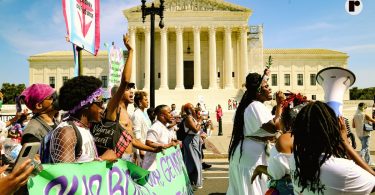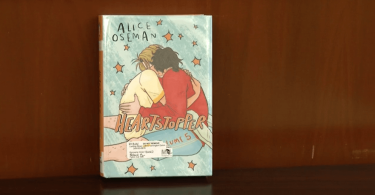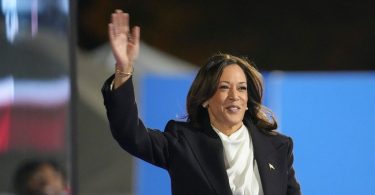Earlier this month, as speculation grew over whether President Joe Biden would withdraw from the 2024 race, a video featuring a supercut of footage of Kamala Harris alongside audio and visuals from Charli XCX’s new album, Brat, went viral on social media.
The post was neither the first nor the last of its kind. Hours after Biden’s announcement on July 21 that he would step aside to back his vice president’s historic bid for the nomination, a photo was circulated on X of men wearing matching cropped tees in Brat green (hex code: #89CC04) that were emblazoned with Kamala’s name in the album’s Arial Narrow typeface.
Minutes after the photo was shared with the caption, “BRAT Kamala shirts already on Fire Island. The gays move SO FAST,” the artist herself weighed in, posting “kamala IS brat.” The vice president then followed Charli XCX on social media and a Brat-themed banner image was uploaded to Kamala HQ, the campaign’s official, newly rebranded rapid response page on X.
Over the next week, as they covered the convergence of support for Harris among Democratic Party officials, delegates, donors, and elected officials, news organizations directed their attention, too, to the groundswell of online support for her candidacy, which inevitably meant confronting questions like what exactly was meant by proclamations that Kamala is Brat.
The album, which dropped on June 7, was an instant hit among Charli XCX’s LGBTQ fans. By this point, the “young girl from Essex” had become, as Pink News wrote, “synonymous with queer pop-music lovers,” particularly since her second EP “Vroom Vroom” was released in 2016 and “critics didn’t get it, but the gays did.”
Likewise, many of the pro-Harris social media posts seen recently, including those referencing music and themes from Brat, are inscrutable, though not for the predominantly young and LGBTQ online audiences by and for whom the content was created in the first place for purposes of giving voice to the post-July 21 vibe shift in the election and the jolt of enthusiasm they feel for the vice president’s candidacy.
“One of the things that I’m loving about this election cycle so much is the meme-ification of politics — brat summer, you know, I’m learning things about the internet that I didn’t know,” Human Rights Campaign National Press Secretary Brandon Wolf said during the organization’s Out for Harris LGBTQ+ Unity Call on Friday.
After the 2.5-hour virtual event wrapped, with remarks from a slate of LGBTQ elected leaders and celebrities, Wolf joined colleagues including HRC President Kelley Robinson for a dance party set to Beyoncé’s “Freedom.”
The rousing anthem was played by Harris in her first public appearances following Biden’s exit from the race and in her campaign’s first ad, which was released Thursday morning.
“There are some people who think we should be a country of chaos, of fear, of hate,” the vice president says in the video, over footage of Donald Trump and his running mate U.S. Sen. JD Vance of Ohio. “But us, we choose something different.” A crowd chants, “Kamala! Kamala! Kamala!” and Harris proclaims “we choose freedom,” as the booming chorus to “Freedom” begins.
The use of Beyoncé’s music and this song in particular is suffused with layers of meaning, from the contrast Harris’s campaign is drawing between her and her opponents’ visions for the future of America to her position as the country’s first Black woman poised to win a major party’s nomination for president.
The decision might also signal Harris’s embrace of her LGBTQ supporters, just as her campaign did by celebrating the queer online fandom she has enjoyed in recent weeks. After all, Beyoncé’s work has often celebrated Black queer culture, love that has been reciprocated by the community throughout the singer’s career.
The source material for recent viral online content about Harris is largely comprised of clips taken from audio and video footage of the vice president’s public remarks that were originally shared in many cases by critics and political opponents for purposes of presenting her as unserious (or mocking her words, laugh, and mannerisms).
Most were excerpted from a speech last year at the swearing-in ceremony for the White House Initiative on Advancing Educational Equity, Excellence, and Economic Opportunity for Hispanics, where Harris relayed an anecdote about how her mother “would give us a hard time sometimes, and she would say to us, ‘I don’t know what’s wrong with you young people. You think you just fell out of a coconut tree?’” (Laughs.)
“You exist in the context of all in which you live and what came before you,” the vice president said.
By the end of June into early July, in the wake of the president’s poor performance against Trump in the televised CNN debate that spurred calls for him to step out of the race, clips from and references to Harris’s speech once again cropped up across social media platforms.
This time, however, they tended to signal support for the vice president, even before it became clear, starting with Biden’s endorsement, that she was favored to lead the Democratic Party ticket in 2024.
For instance, the “coconut tree” clip was used to kick off the viral supercut featuring imagery and music from Brat (the track “Von Dutch”).
In another post, shared on X by the Virginia Young Democrats LGBTQIA+ Caucus, emojis of coconuts and coconut trees were used to supplant the letters “o” and “t” to spell out “Hot To Go” a song by the queer artist Chappell Roan.
Many users shared videos with footage of the song “Coconuts” by trans singer Kim Petras (or from the lip sync battle featuring the song during Season 8 of “RuPaul’s Drag Race All Stars” with queens Jessica Wild and Ra’Jah O’Hara).
Sometimes, these were cut with footage from the vice president’s speech or used in posts urging her to feature the song in her campaign.
Coconuts aside, another through-line connecting much of the pro-Harris social media content seen over the past few weeks was their inclusion of years-old clips of the vice president dancing.
Especially popular were videos in which she was grooving on stage in the rain while holding an umbrella during a campaign rally in 2020 and showing off her moves at the Iowa Democratic Party’s Liberty and Justice celebration in 2019.
For example, both were included in this viral July 21 supercut featuring RuPaul’s “Call Me Mother.”
Eventually, the playful and enthusiastic posts from young, queer corners of the internet seemed to inspire the Democratic Party establishment and its elected leaders.
Hours after Biden’s endorsement of Harris, U.S. Sen. Brian Schatz (D-Hawaii) posted a photo of himself climbing a coconut tree with the caption, “Madam Vice President, we are ready to help.”
Once again, the Harris campaign leaned in, updating the bio of the Kamala HQ page on X to read: “Providing context,” another nod to her famous 2023 speech.
Looking ahead to November, it is hardly clear whether and to what extent the online enthusiasm for Harris and her campaign will be sustained.
Of course, a political candidate’s “memeability” is hardly an an exact proxy for public opinion. And online narratives can change over time, as demonstrated by the ways in which content featuring the vice president, like the footage of her “coconut tree” remarks, was co-opted by supporters who transformed them into pro-Harris memes and videos.
Also worth noting is the extent to which these have celebrated attributes like the candidate’s laugh and her dance moves rather than, for instance, her record of public service over several decades in public life or her campaign’s policy agenda.
Additionally, messaging from Trump and his allies and supporters suggests their strategy of going after Harris’s personality was not blunted by the evolution of online discourse seen on social media platforms. “I call her Laughing Kamala. You ever watch her laugh?… She’s crazy. She’s nuts,” the former president said at a recent rally in Michigan.
Meanwhile, beginning with a July 23 appearance on MSNBC’s “Morning Joe,” Democratic Gov. Tim Walz of Minnesota debuted a similar line of attack against Trump and his running mate U.S. Sen. J.D. Vance of Ohio: “they’re weird.”
During a rally in St. Paul, he said, “The fascists depend on us going back, but we’re not afraid of weird people. We’re a little bit creeped out, but we’re not afraid.”
The remarks made headlines, amplifying calls for Harris to choose Walz as her 2024 running mate while prompting other high-profile Democrats, including other top contenders for the party’s vice presidential nomination, to follow suit.
Among them was out Transportation Secretary Pete Buttigieg, who told MSNBC’s Jen Psaki on Sunday that the characterization of the Republican ticket as “weird” is not just name-calling, but rather a legitimate response to the policies they have proposed and positions they hold.
He pointed to Vance’s statement that the Democratic Party is led by “childless cat ladies,” as well as the vice presidential nominee’s stance that Americans who have children should wield more political power than those who do not.
With respect to Trump, Buttigieg noted the former president’s “talk about terminating the Constitution,” his odd remarks during campaign rallies about subjects like the fictional serial killer Hannibal Lecter, and “the dark and twisted things that were kind of shoved in our face all of the time during the Trump presidency and ever since by the Trump campaign.”
For her part, Harris used the epithet on Saturday, though not in direct reference to Trump and Vance. Rather, the vice president characterized her opponents’ swipes against her as “just plain weird.”
Shortly after Vance’s nomination was announced on July 15, a user on X wrote, “can’t say for sure but he might be the first vp pick to have admitted in a ny times bestseller to fucking an inside-out latex glove shoved between two couch cushions (vance, hillbilly elegy, pp. 179-181).”
The claim was totally bogus, but the post nevertheless went viral along with a deluge of memes and videos poking fun at Vance that flooded social media platforms alongside the viral pro-Harris content over the past few weeks.
And just as news organizations had brought offline attention to the “Kamala is brat” memes and “coconut pilled” supercuts, the social media posts about Vance reached even wider audiences when, for instance, John Oliver, host of the late-night program “Last Week Tonight,” called Republican campaign officials on Sunday with an inquiry about whether their vice presidential candidate ever had intercourse with a sofa.







